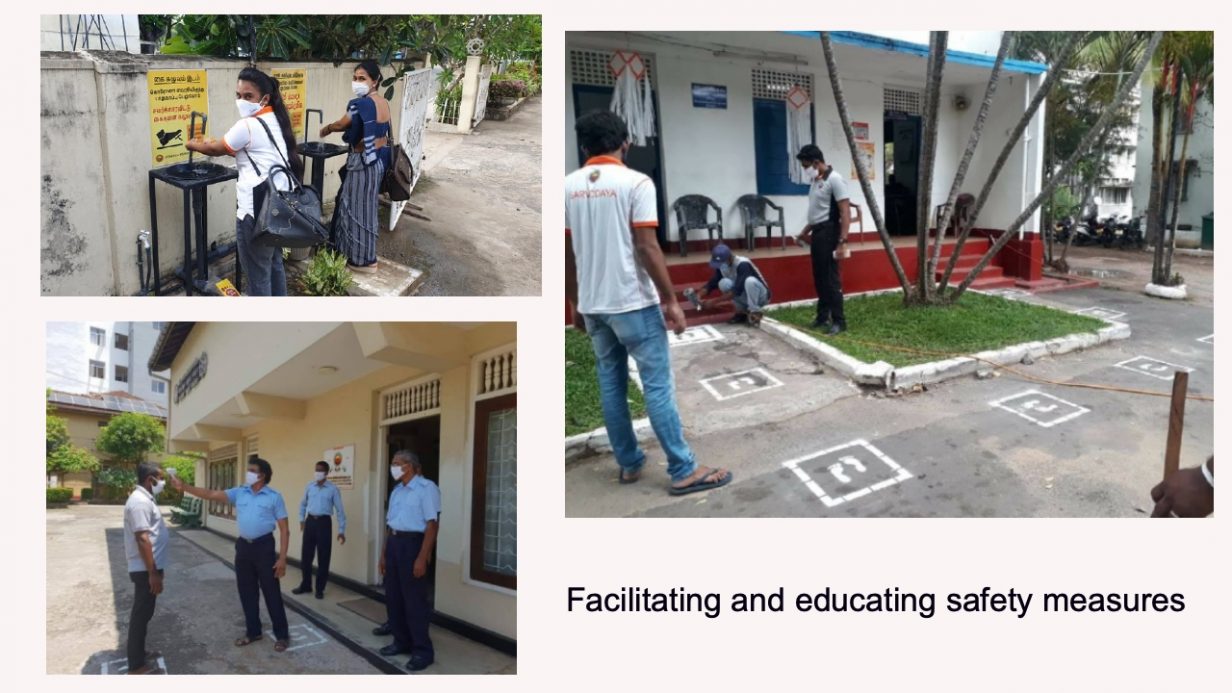Current Status
Sri Lanka has been able to contain the pandemic to a very great extent with minimum community spreading. The government’s response at a national level has helped place Sri Lanka in Stage 3 as per WHO categorization.


Challenges
While the government bodies are implementing curfew, lockdown and limited movement strategies with healthcare and mitigation plans in parallel, there are hardly any community based organizations and civil societies engaging at the ground level. While people, individually as well as in informal groups are working towards meeting the needs of the communities in need, there are gaps that need to be fulfilled in an accountable manner in order to mitigate the pandemic in the long term.
Government administrators and health staff/institutions, along with local level communities have reached out and appealed to community based organizations to put programs in place in response to the pandemic.
Communication such as current risks, guidelines for transitioning to the workplace, guidelines regarding public health are not dissipated far enough down the line to reach certain communities who don’t have access to modes of media be it paper, television and radio, or virtual mediums.
There is a rise in social stigma and discrimination (even criminalization in certain cases) of COVID-19 positive patients and their families. In some cases extending out to their communities and workplaces as well.
Even with exemplary health care services catered to test, and to treat the COVID-19 virus patients, some practices that have no scientific backing, and certain attitudes that are not in line with medical ethics have popped up.
Women centric workplaces and households are facing risks due to the lack of their involvement in the decision making process. Due to their absence, decisions are not made centering women’s health and safety, putting them at a higher risk than usual.
Formation of new clusters: prisons, friends and family circles of returning migrant workers, etc.
Strategic Actions
Mobilizing and engaging community leaders/volunteers and community based organizations (CBOs) in the prevention and control of COVID-19 while addressing its health and social impact in parallel.
Engaging, educating and enabling communities, including vulnerable community groups, on COVID-19 preventive measures. Supporting them to adopt practical protective measures to taking the limitations they face into consideration.
Strengthening the leadership and meaningful participation of women in all decision-making.
Mobilizing religious/faith leaders in COVID-19 prevention and control activities.
Strengthen partnerships between government and private non-profit stakeholders to promote community engagement.
Develop and disseminate COVID-19 risk communication materials in Sinhala, Tamil and English targeting specific social groups.
Objectives of the Strategic Plan
To facilitate effective two-way communication between health authorities and communities in response to COVID-19 and other health related issues.
To engage the communities actively and proactively in decision making; planning, designing, implementing, monitoring and evaluation of their COVID-19 response.
To promote unity and reduce the stigma associated with contracting the virus or testing positive of the COVID-19 strain.
Conduct early and on-going participatory assessments of at-risk communities: their perception, knowledge, preferred and accessible communication channels, existing barriers that prevent people to adopt promoted behaviors etc.
Ensure that all people at risk of acquiring COVID-19 are identified, reached and involved.




Leave a Reply
You must be logged in to post a comment.